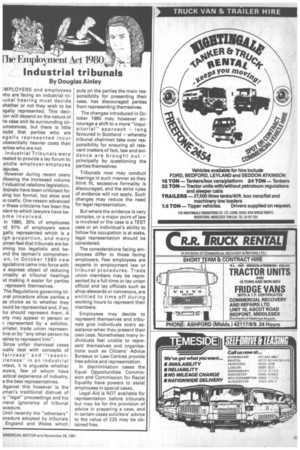[be Employment Act 198
Page 39

If you've noticed an error in this article please click here to report it so we can fix it.
Industrial tribunals
By Douglas Ainley
EMPLOYERS and employees vho are facing an industrial tri m na I hearing must decide vhether or not they wish to be agally represented. This deciion will depend on the nature of he case and its surrounding cirumstances, but there is little loubt that parties who are egally represented incur ubstantially heavier costs than arties who are not.
Industrial Tribunals were reated to provide a lay forum to andle employer-employee isputes.
However during recent years Wowing the increased volume I industrial relations legislation, ibunals have been criticised for eing too formal, too slow and )o costly. One reason advanced )r these criticisms has been the (tent to which lawyers have beorne involved.
In 1980, 35% of employees id 51% of employers were gaily represented which is a igh proportion, and many ymen feel that tribunals are be)ming too legalistic and be)nd the layman's comprehenon. In October 1980 new agulations came into force with e express object of reducing rmality at tribunal hearings 1c1 making it easier for parties represent themselves.
The Regulations governing triJnal. procedure allow parties a ae choice as to whether they lould be represented and, if so, ho should represent them. A irty may appear in person or represented by a solicitor, 3rrister, trade union representive or by "any other person he sires to represent him".
Since unfair dismissal cases many deal with concepts of fairness" and "reason)Ieness" in an industrial intext, it is arguable whether ovyers, few of whom have actical experience of industry, e the best representatives.
Against this however is the iman's traditional distrust of iy "legal" proceedings and his !nerd l ignorance of tribunal ocedu re.
Until recently the "adversary" ocedure adopted by tribunals England and Wales which puts on the parties the main responsibility for presenting their case, has discouraged parties from representing themselves.
The changes introduced in October 1980 may however encourage a shift to a more "inquisitorial" approach – long favoured in Scotland – whereby tribunal chairmen take over responsibility for ensuring all relevant matters of fact, law and evidence are brought out – principally by questioning the parties themselves.
Tribunals now may conduct hearings in such manner as they think fit, excessive formality is discouraged, and the strict rules of evidence will not apply. Such changes may reduce the need for legal representation.
But where the evidence is very complex, or a major point of law is involved or the case is a TEST case or an individual's ability to follow his occupation is at stake, legal representation should be considered.
The considerations facing employees differ to those facing employers. Few employees are experts in employment law or tribunal procedures. Trade union members may be represented by a full-time or lay union official and lay officials such as shop-stewards or convenors, are entitled to time off during working hours to represent their members.
Employees may decide to represent themselves and tribunals give individuals every assistance when they present their. own case. Nonetheless many individuals feel unable to represent themselves and organisations such as Citizens' Advice Bureaux or Law Centres provide free advice and representation.
In discrimination cases the Equal Opportunities Commission and Commission for Racial Equality have powers to assist employees in special cases.
Legal Aid is NOT available for representation before tribunals but may be for the provision of advice in preparing a case, and in certain cases solicitors' advice to the value of £25 may be obtained free.








































